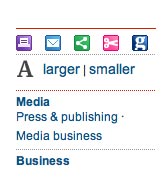Journalism.co.uk talks to reporters across the globe working at the collision of journalism and social media about how they see it changing their industry. This week, Matthew Buckland from Mail & Guardian, South Africa.
1) Who are you and what do you do?
I am Matthew Buckland, the GM of Mail & Guardian Online.
As head of the online division I am responsible for the overall online and mobile strategy, with an overview of editorial, production, technical and online sales.
I am also involved quite heavily in our social media strategies and sites.
2) Which web or mobile-based social media tools do you use on a daily basis and why?
I use Twitter, both web and mobile. I blog on my own blog about online media, web 2.0 and technology, thoughtleader.co.za and sometimes on Poynter’s new media titbits.
I use Mybloglog on my blog quite a bit. I use Facebook web and mobile… but less and less these days. At the end of last year I began using Slideshare to share my presentations and see others. I Digg every now and again, and use a local version, Muti.co.za.
I also keep half an eyeball on Linkedin – but don’t really do it justice. I am an occasional Del.ici.ous user. I use both Flickr and Picasa as online photo albums/photo sharing.
For video sharing I use Youtube, obviously. I’m also a wikipediaholic.
I used SecondLife for about a week, but realised it would be best for my health to shut it down and never look at it again 🙂
Generally I find these social media tools are a good way of networking, sharing ideas and content, and building relationships with people. They also waste a lot of time and create noise in my life.
3) Of the thousands of social media tools available could you single one out as having the most potential for news either as a publishing or newsgathering tool?
I think of all the hyped up social media tools we’ve seen, blogging has shown that it is more than just a fad, but here to stay.
We’ve seen how mainstream online publishers have embraced blogs both as new publishing formats and newsgathering tool with considerable success.
4) And the most overrated in your opinion?
I’m beginning to think Facebook is overrated. The novelty is wearing off and people are getting bored, very quickly.




